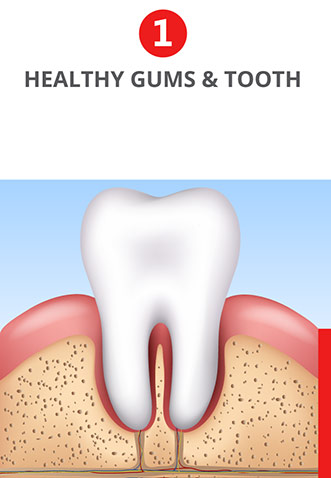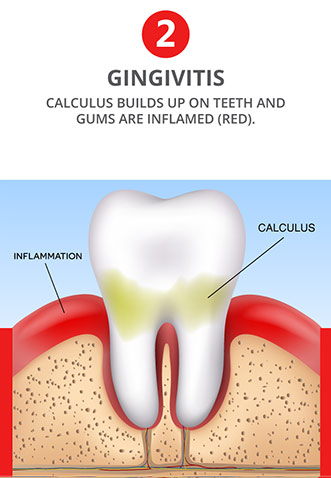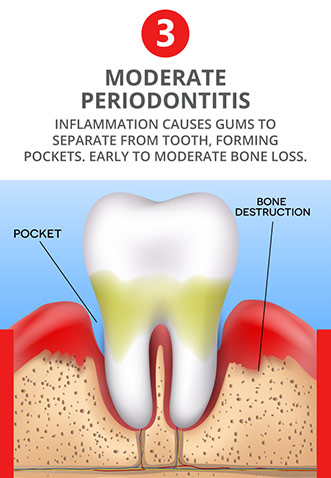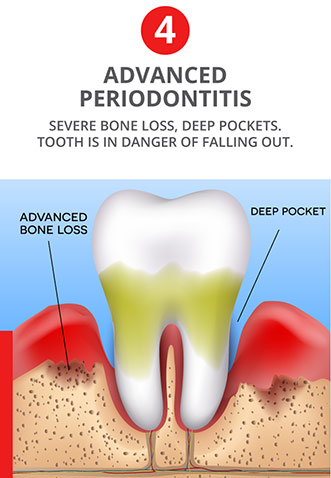85% of US adults have some form of gum disease. From the earliest stages of gingivitis to the more advanced stages of periodontitis, gum disease is one of the most prevalent diseases in our society, yet remains largely unknown. The study “Prevalence of Periodontitis in Adults in the United States: 2009 and 2010”, estimates that 47% of adults have moderate-severe gum disease, which translates to more than 64 million people. When you look at the population over 65, the percentage jumps to over 70% with moderate-severe gum disease.
Although the numbers vary, one fact is constant – millions of Americans have gum disease. And, unfortunately, the odds are you have it, too; you just don’t know it. Here’s what you need to know about gum disease and what you can do about it.
Gum Disease: The Silent Killer
Gum disease, also called periodontal disease, is an infection of the tissues and bone that support your teeth. It occurs when germs infect the gum tissues around the teeth, causing redness, swelling and bleeding. Gum disease has been linked to major health problems including heart disease, strokes, preterm and stillborn births, as well as certain cancers. It is the leading cause of tooth loss for adults.
Gingivitis and periodontitis are two stages gum disease. Here’s the difference between them:
Gingivitis: A less severe form of gum disease, gingivitis is inflammation of the gums caused by plaque build up. Plaque is the film found on your teeth. It is a sticky combination of germs and bacteria known as a biofilm. If not brushed away, plaque hardens into a barnacle-like material to form calculus, commonly known as tartar. Just like lime deposits on a shower drain, the hardened calculus is difficult to remove. The biofilm will continue to grow and infect your gums, sometimes causing redness and bleeding you may or may not see.
 |  |
Periodontitis: Gingivitis, if left untreated, will progress to periodontitis. With periodontitis, calculus deposits expand on the surface of your teeth, edging down below your gum line. This condition causes your gums to separate slightly from the teeth and supporting bone, forming periodontal pockets. It creates swelling, bleeding, pain while chewing, teeth misalignment and looseness. Some patients also have sores inside the mouth, persistent bad breath, and sensitive teeth. A discharge of puss from the gums, called pyorrhea, is another a symptom of periodontitis.
Untreated gingivitis will progress and become periodontitis, a much more severe form of gum disease. The infection and the pockets may continue to deepen, eating away at the jawbone until your teeth become loose and fall out—unless you seek treatment.
 |  |
Can I avoid getting gum disease?
Prevention is always the least painful and least expensive path to good health. If there are no infections, then your dentist or hygienist will suggest a plan that includes regular brushing, flossing and dental hygiene visits as your best bet for avoiding dental infections.
It is critical that you don’t skip your regular cleanings every six months. Make sure your dentist checks for the signs of gum diseases to help catch the disease in early stages. Dental professionals will do this by probing – inserting a small probe between your gum line and tooth to identify pockets. During the process, they may call out numbers – these numbers correspond to pocket depths. In this case, lower numbers are definitely better.
Take care of your gums to take care of your health.
If you are one of the 85% of adults with gum disease according to US Surgeon General statistics, don’t risk the health of your body by avoiding treatment of your mouth. Ask your dentist about the LANAP protocol to eliminate periodontal infection for healthier gums and a healthier body.
Take control of your health—and your life—by treating gum disease today, before you lose teeth tomorrow.
Robert H. Gregg II, DDS is a co-developer of the PerioLase® MVP-7™ pulsed Nd:YAG laser and the LANAP protocol. Dr. Gregg is a co-founder of Millennium Dental Technologies, Inc. and is the Program Director of the Institute for Advanced Laser Dentistry. Recognized as one of the top 250 Leaders in Dental Education by Dentistry Today for 2009-2012, he is a peer-review member of the Dentistry Today CE Editorial Board. He maintains a private practice in Cerritos, California.
Sources:
“CDC: Half of American Adults Have Periodontal Disease.” www. Perio.org. Web. 15 April 2016. https://www.perio.org/consumer/cdc-study.htm#OverlayWrapper/0/.
“Medical Terminology Word Pyrorrhea.” Easymedicalterminology.Blogspot.com. Web. 15 April 2016. http://easymedicalterminology.blogspot.com/2015/04/medical-terminology-word-pyrorrhea.html.
“Gingivitis vs. Periodontitis.” Crest.com. Web. 15 April 2016. http://crest.com/en-us/oral-care-topics/gum-disease/gingivitis-vs-periodontitis.


My wife and I want to make sure our two sons stay as healthy as possible. It really helped when you stated that bi-annual checks along with prevention methods are the best way to prepare against gum disease because I’ve met a couple of friends who have been complaining about gum pains and they can admit they only took the prevention methods seriously much later into their life. I’ll be sure to get the kids to start the habit early while looking for a dentist that can give us regular checkups every year. Thank you!
i have learned a great deal about gum disease today …..
Great read! Thank you so much for sharing this. I really learned a lot when it comes to gum disease. Question, what’s the best way to prevent gum disease?